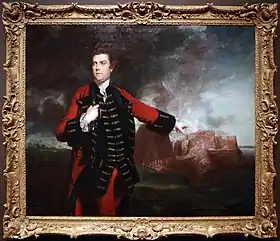William Keppel (British Army officer, born 1727)
Lieutenant-General William Keppel (5 November 1727 – March 1782) was a British Army officer and Member of Parliament.
William Keppel | |
|---|---|
| Born | 5 November 1727 |
| Died | March 1782 |
| Allegiance | |
| Service/ | British Army |
| Rank | Lieutenant General |
| Commands held | Ireland |
| Battles/wars | Seven Years' War |
Life
He was born the third son of Willem van Keppel, 2nd Earl of Albemarle, and educated at Westminster school.
He joined the British Army as an Ensign in the 2nd Foot Guards in 1744, and was promoted to the rank of lieutenant in 1745. He transferred as captain-lieutenant to the 1st Foot Guards in 1751, and was promoted captain and lieutenant-colonel in 1752 and a colonel of the Army in 1760. On 17 December 1761 he was appointed colonel of the 56th Regiment of Foot, which he commanded until 1765. He was made major-general in 1762. [1]

In 1762, he took part (with his brothers the Earl of Albemarle and Hon. Augustus Keppel) in the British expedition against Cuba, and directed the storming of Morro Castle.[2] In 1763, he succeeded Albemarle as British Governor of Cuba. The island was returned to Spain in July 1763.[3]
On 31 May 1765, he was appointed colonel of the 14th Regiment of Foot,[3] which he commanded until 1775, during which time he was elevated to lieutenant-general (1772).
From 1767 until his death, he was a Member of Parliament for Chichester.[1]
He was Commander-in-Chief, Ireland in 1773. On 18 October 1775 he was appointed colonel of the 12th Royal Lancers, which he commanded until his death. He was Gentleman of the Horse to King George III of Great Britain and died unmarried in 1782.[4]
References
- "KEPPEL, Hon. William (1727-82)". History of Parliament Online. Retrieved 5 March 2018.
- The Capture of Havana, 1762: The Morro Castle and the Boom Defence Before the Attack National Maritime Museum
- Richard Cannon, Historical Record of the Fifty-Sixth, or the West Essex Regiment of Foot
- thePeerage.com
| Court offices | ||
|---|---|---|
| Preceded by Hon. Charles Roper |
Page of Honour 1741–1746 |
Succeeded by Harvey Smith |
| Preceded by James Brudenell |
Gentleman of the Horse 1747–1760 |
Succeeded by Richard Berenger |
| Parliament of Great Britain | ||
| Preceded by John Page Lord George Henry Lennox |
Member of Parliament for Chichester 1767–1782 With: John Page 1767–68 Thomas Conolly 1768–80 Thomas Steele 1780–82 |
Succeeded by Thomas Steele Percy Charles Wyndham |
| Military offices | ||
| Preceded by Lord Charles Manners |
Colonel of the 56th Regiment of Foot 1761–1765 |
Succeeded by James Durand |
| Preceded by Charles Jeffereys |
Colonel of the 14th Regiment of Foot 1765–1775 |
Succeeded by Robert Cuninghame |
| Preceded by Unknown |
Commander-in-Chief, Ireland 1773–1774 |
Succeeded by The Lord Heathfield |
| Preceded by Sir William Augustus Pitt |
Colonel of the 12th (The Prince of Wales's) Regiment of (Light) Dragoons 1775–1782 |
Succeeded by George Lane Parker |